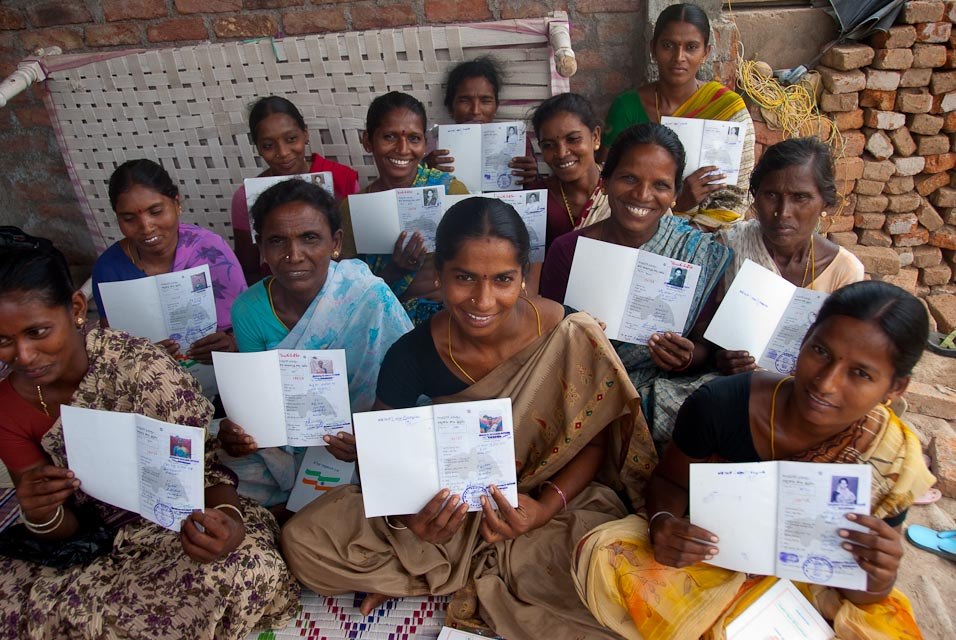
Landesa: Women’s landrights secured
Land rights are the foundation required for other development tools – education, public health, microfinance, sanitation, nutrition, among others – to take root. Land rights allows the people to invest in their land increasing agricultural production and economic development. Rising living standards and improved land stewardship reduces conflicts and contributes to a safer future. Women produce as much as 60-80% of food in developing countries, yet rarely have secure land rights to the land they farm. Landesa is working to change this by modifying land title forms to include the woman’s name and educating women about their legal rights to own land. Over the last 40 years, Landesa has partnered with 50 developing country governments on legal reforms that have helped more than 100 million of the world’s poorest people.
Impact
Over the last 40 years, Landesa has partnered with 50 developing country governments on legal reforms that have helped more than 100 million of the world’s poorest people. Our offices in China and India allow us to maintain ongoing relationships with host governments, monitor reform achievements and build local capacity.
Beneficiaries
The vast majority of the world’s poor – those living on under $2 a day – live in rural areas. For the rural poor, land represents a fundamental asset and a primary source of income, security, wealth, opportunity and status. Yet half of rural families in the developing world, 250 million families, lack either access to land or a secure stake in the land they till. Since its founding, Landesa has worked to serve rural poor farmers in developing countries.
Landesa has identified three geographies: India, China, and Sub-Saharan Africa, where the need and opportunity are greatest. 60% of the world’s rural poor – over 800 million people – live in India and China. In Sub-Saharan Africa 226 million of the continent’s 760 million people live in rural poverty.
Women represent over 50% of the world’s population and provide 60-80% of the developing world’s agricultural labor, yet they rarely own the land they farm. Secure land rights for women can lead to many economic and social benefits; increased household income, increased food security and agricultural productivity, access to credit, decreased incidence of HIV/AIDS and better protection against domestic violence and homelessness.
Sustainability
Landesa’s work hinges on our partnerships with governments. In fact, our history of success is only possible because of our deep commitment to collaborating with governments to create synergy and leveraged impact. Where many individuals and organizations creatively find ways to sidestep local bureaucrats, Landesa understands that lasting change must come from both the top and the local community level. As a result, Landesa has forged relationships with public sector leaders who now have a shared commitment as champions of land rights for the rural poor. This helps make land rights a structural and durable investment for the rural poor. And, this model allows sustainable change at a low cost. On average, Landesa has provided land rights to six families for every dollar invested.
While Landesa’s partnerships with governments are different in each setting, we do follow a similar approach in all. This approach involves five key activities: research, identifying and working with influential “champions”, designing specific policy solutions, country specific advocacy, and implementation support.
Innovation
Much of the strength of Landesa’s innovative model lies within its partnerships with governments. With over 40 years of comparative experience in 50 countries, Landesa is uniquely positioned to help governments tackle complex land issues.
Landesa’s work is also innovative in its carefully tailored approach to fit the particulars of geography, political institutions, history and culture. There are no cookie-cutter solutions to land rights issues, and any legal reforms must be locally legitimate to be recognized and enforced. Landesa’s programs are also not confiscatory or punitive. Rather, they broaden secure land access for the poorest and create win-win policies.
Scalability
What started as the convictions of a brilliant young attorney four decades ago to achieve massive social impact has now evolved into a global organization with a proven theory of change that has changed the lives of millions around the world and is now poised to become even more impactful.
Over the last few years a leadership transition from founder Roy Prosterman to his protégé Tim Hanstad kicked off a transformation in the organization that began to accelerate its growth and related capacity to catalyze structural changes resulting in massive social impact. Landesa has an ambitious six-year plan to reach an additional 20 million of the world’s poorest families by 2015. The plan includes three key elements:
- expanding existing programs in India, China, and sub-Saharan Africa;
- creating a center to focus on cross-cutting issues related to women’s land rights; and
- raising awareness of pro-poor land rights reform needs and interventions within the global development community.
We are more convinced than ever that land rights is a pivotal issue whose time has come – perhaps the most durable development intervention within the poverty alleviation sector. Growing recognition of the link between secure land rights and other key issues – health, conflict and security, and women’s empowerment – is creating momentum.
Source of funding
FOUNDATIONS: Foundation revenues provide the greatest scope for Landesa to develop and drive its own program work. Landesa has received funding from numerous foundations: the Omidyar Network, the Bill & Melinda Gates Foundation, Riverstar Foundation, Nike Foundation, Google, and the Ford Foundation.
PUBLIC AND PRIVATE EARNED INCOME CONTRACTS: Landesa will continue to assertively pursue public and private fee-for-service contracts when such funding aligns with its own strategy and goals.
Individuals: Individual donations typically represent an important source of unrestricted revenue, which will be needed as Landesa grows funding from the foundation and earned income segments.